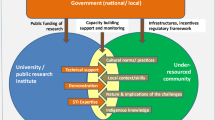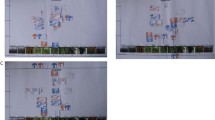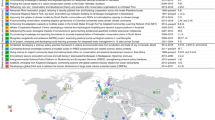Abstract
There is growing belief that the co-production of knowledge between academics and non-academics is critical to address sustainability problems. Yet, little is known about what happens after co-production and whether and how co-produced knowledge scales up. This article focuses on climate-driven decision support tools co-produced by researchers, farmers and agricultural advisers in the US Midwest. Through two surveys (N = 5,393) with farmers and agricultural advisers, it examines how engagement and marketing campaigns to disseminate the tools influenced their use. Here we find that beyond the highly iterative co-production process, other forms of user interaction such as outreach engagement and marketing campaigns are critical to scale up the impact of co-produced knowledge. Positively, we also show that most surveyed farmers and advisers who were not involved in the engagement phase reported having their needs met by the co-produced tools and were using, considering using or willing to recommend the climate-driven decision support tools. Hence, while co-production alone does not guarantee dissemination, it does increase knowledge fit and use. Dissemination for mass use, however, might require a committed effort from researchers and funders to promote and evaluate use post co-production to better understand societal impact and the role of co-produced knowledge in addressing sustainability problems.
This is a preview of subscription content, access via your institution
Access options
Access Nature and 54 other Nature Portfolio journals
Get Nature+, our best-value online-access subscription
$29.99 / 30 days
cancel any time
Subscribe to this journal
Receive 12 digital issues and online access to articles
$119.00 per year
only $9.92 per issue
Buy this article
- Purchase on Springer Link
- Instant access to full article PDF
Prices may be subject to local taxes which are calculated during checkout

Similar content being viewed by others
Data availability
The advisers and farmers survey data and associated questionnaires that support the findings of this study are available in Purdue University Research Repository with identifiers https://doi.org/10.4231/R78W3BBV and https://doi.org/10.4231/R7G44N9S (refs. 41,43).
References
Norström, A. V. et al. Principles for knowledge co-production in sustainability research. Nat. Sustain. 3, 182–190 (2020).
Mach, K. J. et al. Actionable knowledge and the art of engagement. Curr. Opin. Environ. Sustain. 42, 30–37 (2020).
Bremer, S. & Meisch, S. Co-production in climate change research: reviewing different perspectives. Wiley Interdiscip. Rev. Clim. Change 8, e482 (2017).
Lemos, M. C. et al. To co-produce or not to co-produce. Nat. Sustain. 1, 722–724 (2018).
Kirchhoff, C. J., Lemos, M. C. & Dessai, S. Actionable knowledge for environmental decision making: broadening the usability of climate science. Annu. Rev. Environ. Resour. 38, 393–414 (2013).
Popovici, R. et al. Coproduction challenges in the context of changing rural livelihoods. J. Contemp. Water Res. Educ. 171, 111–126 (2020).
Prokopy, L. S. et al. Useful to usable: developing usable climate science for agriculture. Clim. Risk Manage. 15, 1–7 (2017).
Meadow, A. M. et al. Moving toward the deliberate coproduction of climate science knowledge. Weather Clim. Soc. 7, 179–191 (2015).
Beier, P., Hansen, L. J., Helbrecht, L. & Behar, D. A how-to guide for coproduction of actionable science. Conserv. Lett. 10, 288–296 (2017).
Meehan, K., Klenk, N. L. & Mendez, F. The geopolitics of climate knowledge mobilization: transdisciplinary research at the science–policy interface(s) in the Americas. Sci. Technol. Human Values 43, 759–784 (2017).
Vincent, K., Carter, S., Steynor, A., Visman, E. & Wågsæther, K. L. Addressing power imbalances in co-production. Nat. Clim. Change 10, 877–878 (2020).
Wall, T. U., Meadow, A. M. & Horganic, A. Developing evaluation indicators to improve the process of coproducing usable climate science. Weather Clim. Soc. 9, 95–107 (2017).
Vincent, K., Daly, M., Scannell, C. & Leathes, B. What can climate services learn from theory and practice of co-production? Clim. Serv. 12, 48–58 (2018).
Bremer, S. et al. Toward a multi-faceted conception of co-production of climate services. Clim. Serv. 13, 42–50 (2019).
Cash, D. W., Borck, J. C. & Patt, A. G. Countering the loading-dock approach to linking science and decision making: comparative analysis of El Niño/Southern Oscillation (ENSO) forecasting systems. Sci. Technol. Human Values 31, 465–494 (2006).
Lemos, M. C., Kirchhoff, C. J. & Ramprasad, V. Narrowing the climate information usability gap. Nat. Clim. Change 2, 789–794 (2012).
Jagannathan, K. et al. Great expectations? Reconciling the aspiration, outcome, and possibility of co-production. Curr. Opin. Environ. Sustain. 42, 22–29 (2020).
Moss, R. H. et al. Evaluating knowledge to support climate action: a framework for sustained assessment. Report of an independent advisory committee on applied climate assessment. Weather Clim. Soc. 11, 465–487 (2019).
Goodrich, K. A. et al. Who are boundary spanners and how can we support them in making knowledge more actionable in sustainability fields? Curr. Opin. Environ. Sustain. 42, 45–51 (2020).
Vogel, J., McNie, E. & Behar, D. Co-producing actionable science for water utilities. Clim. Serv. 2–3, 30–40 (2016).
U2U Final Project Report of Useful to Usable (U2U): Transforming Climate Variability and Change Information for Cereal Crop Producers (Purdue Univ., 2017).
Lubell, M., Niles, M. & Hoffman, M. Extension 3.0: managing agricultural knowledge systems in the network age. Soc. Nat. Resour. 27, 1089–1103 (2014).
Prokopy, L. S. et al. Agricultural advisors: a receptive audience for weather and climate information? Weather Clim. Soc. 5, 162–167 (2013).
Haigh, T. et al. Agricultural advisors as climate information intermediaries: exploring differences in capacity to communicate climate. Weather Clim. Soc. 7, 83–93 (2015).
Klink, J. et al. Enhancing interdisciplinary climate change work through comprehensive evaluation. Clim. Risk Manage. 15, 109–125 (2017).
Prokopy, L. S. et al. Using a team survey to improve team communication for enhanced delivery of agro-climate decision support tools. Agric. Syst. 138, 31–37 (2015).
Arbuckle, J. G. et al. Climate Change beliefs, concerns, and attitudes toward adaptation and mitigation among farmers in the Midwestern United States. Clim. Change 117, 943–950 (2013).
Haigh, T. et al. Provision of climate services for agriculture: public and private pathways to farm decision-making. Bull. Am. Meteorol. Soc. 99, 1781–1790 (2018).
Mase, A. S., Gramig, B. M. & Prokopy, L. S. Climate change beliefs, risk perceptions, and adaptation behavior among Midwestern U.S. crop farmers. Clim. Risk Manage. 15, 8–17 (2017).
Mase, A. S., Cho, H. & Prokopy, L. S. Enhancing the Social Amplification of Risk Framework (SARF) by exploring trust, the availability heuristic, and agricultural advisors’ belief in climate change. J. Environ. Psychol. 41, 166–176 (2015).
Rogers, E. M. Diffusion of Innovations 5th edn (Free Press, 2003).
Haigh, T. et al. Mapping the decision points and climate information use of agricultural producers across the U.S. Corn Belt. Clim. Risk Manage. 7, 20–30 (2015).
Prokopy, L. S. et al. Adoption of agricultural conservation practices in the United States: evidence from 35 years of quantitative literature. J. Soil Water Conserv. 74, 520–534 (2019).
Prokopy, L. S., Floress, K., Klotthor-Weinkauf, D. & Baumgart-Getz, A. Determinants of agricultural best management practice adoption: evidence from the literature. J. Soil Water Conserv. 63, 300–311 (2008).
Beaman, L. & Dillon, A. Diffusion of agricultural information within social networks: evidence on gender inequalities from Mali. J. Dev. Econ 133, 147–161 (2018).
Warriner, G. K. & Moul, T. M. Kinship and personal communication network influences on the adoption of agriculture conservation technology. J. Rural Stud. 8, 279–291 (1992).
Brugger, J. & Crimmins, M. Designing institutions to support local-level climate change adaptation: insights from a case study of the U.S. cooperative extension system. Weather Clim. Soc. 7, 18–38 (2015).
Lu, J. et al. Explaining the use of online agricultural decision support tools with weather or climate information in the Midwestern United States. J. Environ. Manage. 279, 111758 (2021).
Cash, D. W. et al. Knowledge systems for sustainable development. Proc. Natl Acad. Sci. USA 100, 8086–8091 (2003).
Useful to Usable (U2U) Decision Support Tools (U2U, 2018); http://www.agclimate4u.org/
Koundinya, V. et al. Advisors’ climate risk perceptions and use of climate information: 2016 survey data. Purdue University Research Repository https://doi.org/10.4231/R7G44N9S (2018).
Dillman, D. A., Smyth, J. D. & Christian, L. M. Internet, Phone, Mail and Mixed-Mode Surveys: The Tailored Design Method (Wiley & Sons, 2014).
Singh, A. et al. Farmers’ climate risk perceptions and use of climate information: 2016 survey data. Purdue University Research Repository https://doi.org/10.4231/R78W3BBV (2018).
Agresti, A. An Introduction to Categorical Data Analysis 2nd edn (Wiley & Sons, 2006).
Ott, R. L. & Longnecker, M. T. An Introduction to Statistical Methods and Data Analysis 6th edn (Cengage, 2008).
Yates, F. Contingency tables involving small numbers and the χ2 test. Suppl. J. R. Stat. Soc. 1, 217–235 (1934).
AgClimate View (HPRCC, 2014); https://hprcc.unl.edu/acv.php
About AgClimate Viewer (MRCC, 2014); https://mrcc.illinois.edu/U2U/ACV/aboutacv.html
Angel, J. R., Widhalm, M., Todey, D., Massey, R. & Biehl, L. The U2U Corn Growing Degree Day tool: tracking corn growth across the US Corn Belt. Clim. Risk Manage. 15, 73–81 (2017).
Corn GDD Tool (HPRCC, 2015); https://hprcc.unl.edu/gdd.php
About Corn GDD (MRCC, 2015); https://mrcc.illinois.edu/U2U/gdd/aboutgdd.html
Gramig, B. M., Massey, R. & Yun, S. D. Nitrogen application decision-making under climate risk in the US Corn Belt. Clim. Risk Manage. 15, 82–89 (2017).
Corn Split Nitrogen Application (HPRCC, 2015); https://hprcc.unl.edu/csn.php
About Corn Split N (MRCC, 2015); https://mrcc.illinois.edu/U2U/splitn/aboutsplitn.html
Climate Patterns Viewer (HPRCC, 2015); https://hprcc.unl.edu/cpv.php
About Climate Patterns Viewer (MRCC, 2015); https://mrcc.illinois.edu/U2U/CPV/aboutcpv.html
Irrigation Investment Calculator (HPRCC, 2016); https://hprcc.unl.edu/iic.php
About Irrigation Investment Calculator (MRCC, 2016); https://mrcc.illinois.edu/U2U/irrigation/aboutirrigation.html
Van Dop, M. A. Irrigation Adoption, Groundwater Demand and Policy in the U.S. Corn Belt, 2040–2070. MSc thesis, Purdue Univ. (2016).
Bowling, L. C. et al. Agricultural Impacts of Climate Change in Indiana and Potential Adaptations (IN CCIA, 2020).
Acknowledgements
This research was part of ‘Useful to Usable (U2U): Transforming Climate Variability and Change Information for Cereal Crop Producers’ and was supported by Agriculture and Food Research Initiative Competitive Grant no. 2011-68002-30220 from the USDA National Institute of Food and Agriculture, project website: http://www.AgClimate4U.org. The U2U project team was composed of faculty, staff and students from the following land grant and other universities: Purdue University, Iowa State University, Michigan State University, South Dakota State University, University of Illinois, University of Michigan, University of Missouri, University of Nebraska-Lincoln and University of Wisconsin. M.C.L. was also supported by National Oceanic and Atmospheric Administration (NOAA) Climate Program Office (grant no. NA15OAR4310148). We also thank L. Esman (Department of Forestry and Natural Resources at Purdue University) for editorial assistance and K. Paine for graphic design assistance.
Author information
Authors and Affiliations
Contributions
J.L., M.C.L. and L.S.P. designed the research; J.L., M.C.L., V.K. and L.S.P. performed the research; J.L. analysed the data; L.S.P. supervised and administrated the project; L.S.P. acquired funding; J.L. and M.C.L. wrote the initial draft; J.L., M.C.L., V.K. and L.S.P. reviewed and revised the draft.
Corresponding authors
Ethics declarations
Competing interests
The authors declare no competing interests
Additional information
Peer review information Nature Sustainability thanks Suraje Dessai and the other, anonymous, reviewer(s) for their contribution to the peer review of this work.
Publisher’s note Springer Nature remains neutral with regard to jurisdictional claims in published maps and institutional affiliations.
Supplementary information
Supplementary Information
Supplementary Fig. 1 and Tables 1–4.
Rights and permissions
About this article
Cite this article
Lu, J., Lemos, M.C., Koundinya, V. et al. Scaling up co-produced climate-driven decision support tools for agriculture. Nat Sustain 5, 254–262 (2022). https://doi.org/10.1038/s41893-021-00825-0
Received:
Accepted:
Published:
Issue Date:
DOI: https://doi.org/10.1038/s41893-021-00825-0
This article is cited by
-
Optimising decision support tools for the agricultural sector
Environment, Development and Sustainability (2024)
-
Pathways from research to sustainable development: Insights from ten research projects in sustainability and resilience
Ambio (2024)
-
Reshoring silicon photovoltaics manufacturing contributes to decarbonization and climate change mitigation
Nature Communications (2023)
-
Principles for transformative ocean governance
Nature Sustainability (2023)
-
Models can enhance science–policy–society alignments for climate change mitigation
Nature Food (2023)



